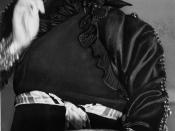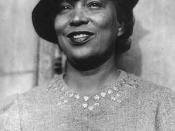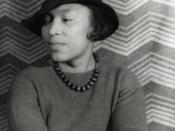Their Eyes Were Watching GodAmerica experienced a dramatic literary transition as the public's mood shifted from hopeful post WWI prosperity, to the dismal outlook of the Great Depression. Zora Neale Hurston's novel Their Eyes Were Watching God, was published a decade too late. Her novel was shunned for many years because of its lack of seriousness and inability to conform to America's literary time period, mainly because of her less then subtle hints of feminism unheard for the time. Literature of the time was characterized by intellectual ideals centered on America's current political situation which the declining economy dictated. Hurston's novel was brought back into the literary light by the African American novelist Alice Walker, for Hurston's bold feministic ideas. Hurston's novel explores complex ideas in a personal light. The novel's foundation is laid through the frame story of Janie's life on her quest for independence as a strong woman.
Janie is able to overcome the adversity that is brought upon by her race and gender, and "reclaim [her] visibility." Their Eyes Were Watching God demonstrates the obstacles of femininity and re-address what it means to be woman, not a woman under the jurisdiction of a man.
Throughout Their Eyes Were Watching God the issue of femininity is highlighted by Janie's relationships with other characters in the novel. The novel builds an unrelenting social hierarchy around Janie and all African American women. White males view African American women as second class citizens and occasional sexual pleasures; Nanny was forced into hiding after finding herself "wid a baby daughter in [her] arms" after being raped by her White master (16). White females use the social status of their race to reassure superiority over their African American counterparts. EvenNanny, a former slave, feels pressured to find a "We don't know...


